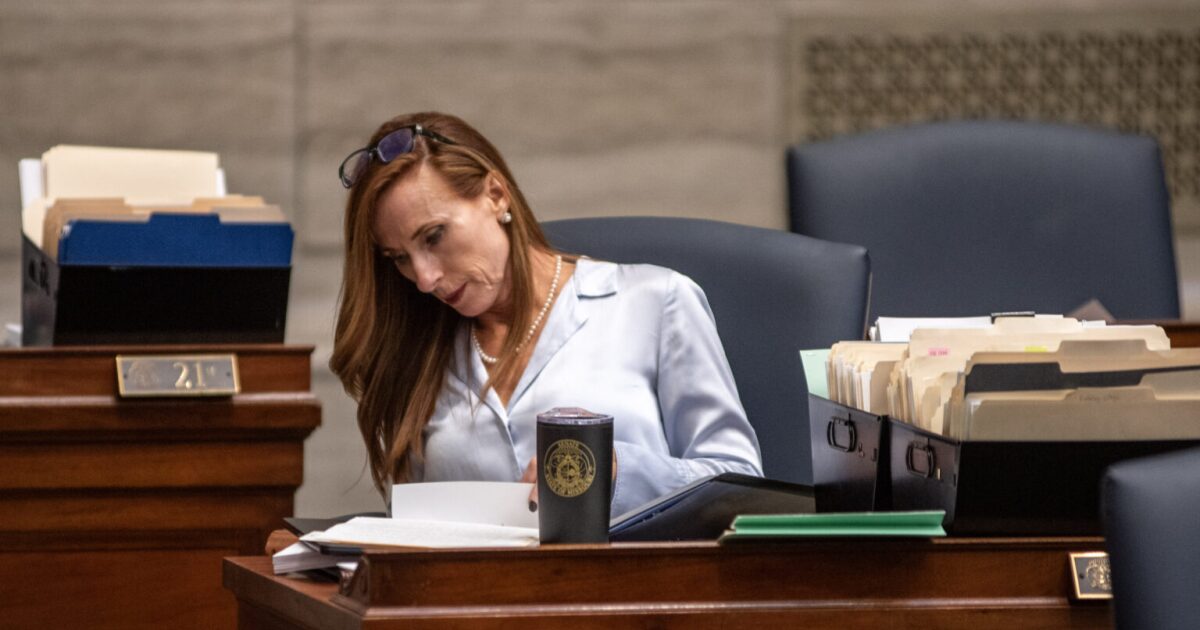Politics
Missouri Senate holds fate of women’s health care bill

A wide-ranging women’s health care bill that stalled in the House for months over concerns about expanding coverage for birth control is a step away from the governor’s desk — though dysfunction in the Senate could derail its chances of becoming law.The bill, an effort by a bipartisan group of five women lawmakers across the House and Senate, would be “a game changer” for women’s health, said state Rep. Melanie Stinnett, a Republican from Springfield.With provisions focused on annual supply birth control, congenital syphilis, mammograms, STI treatment and rape test kits, the legislation is sponsored by Stinnett; state Sen. Elaine Gannon, a DeSoto Republican; State Rep. Tara Peters, a Rolla Republican; State Sen. Tracy McCreery, an Olivette Democrat; and state Rep. Patty Lewis, a Kansas City Democrat.“We need to focus on women’s health, children’s health, babies’ health,” Gannon said. “We have to do whatever we can do to produce healthy people.”Though it got its initial committee hearing in January, the House didn’t pass the bill and send it to the Senate until late April. The delay was caused by a number of Republicans expressing concerns that birth control could be used as an abortifacient, the bill’s sponsors said.Since passing the House with approval from 60 Republicans and 45 Democrats, it has moved quickly in the Senate and was approved unanimously by the chamber’s emerging issues committee on Monday.“This bill was on life support several times as it moved its way forward,” Lewis said. “But no matter what side of the aisle you’re on, it’s politically advantageous to support women’s health care right now.”The sponsors remain hopeful the bill can make it across the finish line before session ends on May 17.But progress in the Senate is stalled as infighting between the Freedom Caucus and Senate Republican leadership has left the chamber with little to show as they run up against a deadline to pass the state budget. Also hanging in limbo is a bill that would make it more difficult to pass citizen-led constitutional amendments, legislation Democrats have staunchly opposed, fearing it could inhibit an abortion rights proposal expected to land on the November ballot.The sponsors of the women’s health care bill argue that unlike other legislation, theirs should not be controversial and thus shouldn’t be a casualty of Senate gridlock.“If the supermajority knew how to govern, they could bulldoze anything through,” Lewis said. “But they are too busy fighting amongst themselves and ultimately playing games with people’s lives.”
Missouri Senate CommunicationsMissouri State Sen. Elaine Gannon speaks on the floor of the Senate in Jefferson City.
Annual supply birth controlPeters said if there’s one thing she’s learned in her freshman term in the House, it’s that all it takes to mount a campaign to kill a bill is the word “abortion.”The legislation, which would allow women on private insurance to pick up an annual supply of contraceptives rather than going to the pharmacy every few months, is already law in 26 states. Studies show this increase in access and continuity can help prevent unintended pregnancy. It does not apply to abortifacients.Stinnett, who has a master’s degree in health care administration and who serves as vice chair of the House Healthcare Reform Committee, said several Republican colleagues had questions about hormonal contraceptives and whether drugs that induce abortions fall under the statute.“At every turn we either had to educate or deflate or talk against what wasn’t true,” Peters said, adding that some lawmakers were spreading inaccurate information that the bill had to do with abortion drugs.After whipping the bill several times, Peters said she ultimately won over the needed support, finally moving the bill out of the House in late April, despite it receiving an initial House committee hearing in January.Only the Missouri Insurance Coalition and America’s Health Insurance Plans and Blue Cross Blue Shield of Kansas City were present to testify in opposition of the birth control policy.A recent survey released by The Right Time, a family planning initiative through the Missouri Family Health Council Inc., showed Missourians overwhelmingly support access to contraceptives,but some fear their lawmakers could pass laws limiting that availability.Of the 1,000 Missourians polled between the ages of 18 and 35, 77% said they believed there should be access to annual supplies of birth control.“I would have to dig pretty deep to find out when the last proactive sexual and reproductive health care legislation of a ‘women’s health type’ passed,” said Mandy Hagseth, the council’s director of policy and external affairs. “So it does not come often and it does not come easy.”Hagseth previously told The Independent that in conversations with women around Missouri, the council learned that access to clinics, lack of consistent transportation and balancing work and children are often barriers to picking up their contraception consistently, which can create gaps in use and increase the chances of an unintended pregnancy.More than 373,000 Missouri women live in contraceptive deserts,which they define as a place where there’s not reasonable access to a full range of contraceptive methods, according to data compiled by Power to Decide. Most are in rural counties.“The Senate has an opportunity to pass a really important, pro-active women’s health bill,” Hagseth said. “At a time that it’s woefully needed sort of generally and politically.”Congenital syphilis testingIn 2022, Missouri recorded 81 congenital syphilis cases — the most in 30 years, the state health department said in an alert distributed earlier this year.From 2017 to 2021, congenital syphilis cases rose 219% across the country; in Missouri, they rose 593%, according to the Centers for Disease Control and Prevention. Between 2012 and 2015, one stillbirth from a congenital syphilis case was reported in Missouri. Since then, there’s been at least one infant death every year, with 18 deaths reported between 2016 and 2022, according to the Missouri Department of Health and Senior Services.Mothers can pass along congenital syphilis in utero at any point in pregnancy. But if caught before the baby passes through the birth canal, the disease is reversible in the womb.For adults, the symptoms, if there are any, can include a rash on the palms of a person’s hands or on the soles of their feet, hair loss, swollen lymph nodes or sores. Often these symptoms go away on their own, even though they are still contagious. If a mother is infected within four weeks of delivering their baby and doesn’t get treatment, the infant has a 40% chance of dying at birth or shortly after, according to the CDC.Right now, only two syphilis tests are required in pregnancy: one in the first trimester and one at birth. The bill would also require a third trimester test for HIV and hepatitis C and hepatitis B, which can cause liver damage in infants.This legislation hopes to address this outbreak by adding additional optional testing for women around 28 weeks of pregnancy during their regularly-scheduled appointment.“Anything we can do to ensure that baby is born healthy, that’s what we need to be doing,” Gannon said.
Tim Bommel
/
Missouri House Tracy McCreery, D-Olivette, speaks on the Missouri House Floor in 2022.
Mammograms, STI treatment and forensic examsMcCreery said after she went in for a mammogram at the start of the year, she received a “weird form letter” that left her thinking she needed additional testing to ensure she didn’t have breast cancer.New federal regulations for mammograms are now at odds with Missouri’s statute, so this bill would update the language given to patients after a cancer screening to be less confusing, as the current language may cause unnecessary concern.“We need to speak in clear, easy to understand terms when we’re communicating with somebody after they’ve had an exam like that,” McCreery said.The bill also hopes to make treatment easier for trichomoniasis, an infection that’s more common in women then men.Under current state statute, if someone is diagnosed with gonorrhea and chlamydia, their doctor is allowed to also treat the patient’s sexual partner in a process called expedited partner therapy. Under this legislation, trichomoniasis would also be added to that list, and it would open the door for syphilis to also be added if federal guidelines change as syphilis rates rise.The final piece of the legislation would smooth out a law passed in 2022 that requires survivors of rape or sexual assault be given the option to ask for a forensic exam.Right now, speciality hospitals without emergency departments are not exempt from the statute, meaning survivors can be taken to health care providers without access to rape test kits. This statute would require that patients initially seen at specialty hospitals be transferred to a hospital with an emergency department equipped to do a forensic exam.This story was originally published in The Missouri Independent, part of the States Newsroom.
Politics
Missouri keeps child marriage legal as push to ban dies in House

Child marriage will remain legal in Missouri for at least another year after Republican House leaders said they don’t have enough time to pass it.
Under current Missouri law, anyone under 16 is prohibited from getting married. But 16 and 17 year olds can get married with parental consent to anyone under 21.
Under legislation that cleared the Senate with virtually no opposition earlier this year, marriage would be banned for anyone under 18. “It was very surprising that the House has not allowed it to come to the body,” said Republican state Sen. Holly Thompson Rehder of Scott City, who sponsored the bill along with Sen. Lauren Arthur, a Democrat of Kansas City.
“Banning child marriage should not be controversial. When I filed this bill, I had no idea it would be controversial,” Rehder added.
The bill was stalled by a group of Republican critics in a House committee, who said it would constitute government overreach and infringe on parental rights. It finally passed out of committee this week after several of those critics were not present at the vote.
But House leadership told reporters Friday morning it was too late to place the bill on the House calendar for debate. Session ends at 6 p.m.
“There’s some interest there, unfortunately the rules preclude us from doing that today,” said House Majority Leader Jon Patterson, a Lee’s Summit Republican.
Arthur said the failure is “shameful.”
“When I talk to people back home, they’re surprised to learn that minors can get married in the first place,” Arthur said. “And these are the kinds of headlines that my friends who are apolitical or live in different parts of the country send me and say, ‘What is happening in Missouri?’
“It makes us look bad,” she said, “but more importantly, we’re not doing enough to protect young girls who are forced into marriages and their lives are worse in every way as a result.”
Twelve other states have in recent years banned child marriage.
Rehder said she was told only around 20 out of 163 House members were opposed. She also said the House could have voted to suspend its rules to allow the bill to be debated and passed before adjournment, but suggested that House Speaker Dean Plocher refused to let the bill move forward to avoid embarrassing Republicans who are opposed to banning child marriage.
“We have the votes,” Rehder said, but it didn’t come up “because the speaker didn’t want to put his members in a bad situation.”
“…Because you shouldn’t be against banning child marriage.”
Rehder said she’s hopeful the bill will succeed next year, in large part due to the “public pressure” of state and national media.
“You cannot sign a legal binding contract in Missouri until you’re 18. But we’re allowing a parent to sign a child into a lifetime commitment. It’s ridiculous.”
Rehder attributed some of the opposition to generational differences.
“People who have been against it — the men who have been against it — who talk to me about it have said, ‘Oh, my grandmother got married at 15.’ Well, yes I did too, mine was 40 years ago,” Rehder said.
“And it didn’t work out because I was operating on not an adult mindset.”
Fraidy Reiss, an activist who founded the nonprofit against forced marriage Unchained at Last was active in testifying in support of the bill in Missouri and has worked nationally to pass similar legislation. Upon hearing the news, Reiss said: “How can legislators live with themselves?”
She added that “dozens of teens will be subjected to a human rights abuse and legally trafficked under the guise of marriage in the coming year,” due to the failure to pass the legislation.
“…How will they explain that to their constituents?”
This story was originally published by the Missouri Independent, part of the States Newsroom.
Politics
Missouri Legislature passes fix to property tax freeze law
One year after they passed the original legislation, Missouri legislators have approved a fix to a law allowing property tax freezes for seniors.Members of the House voted 139-0 Friday to pass the bill. Since it has already gone through the Senate, it now goes to Gov. Mike Parson.The current law allows local governments to pass ordinances that would freeze property taxes for seniors. It also would allow voters to approve such an ordinance.St. Charles and St. Louis counties, as well as the City of St. Louis, have already passed their own ordinances on the issue.The way the law is structured now, only seniors who receive Social Security would be eligible for a property tax freeze. That requirement has left out seniors who are on pensions like police officers and firefighters.Sen. Tony Luetkemeyer, R-Parkville, sponsored both the original bill and the changes this session.“Rather than tying eligibility of the property tax freeze to Social Security eligibility, we instead tied it just to age,” Luetkemeyer said.Rep. Ben Keathley, R-Chesterfield, said the legislature did the first part of the job last year.“Now it’s time to make sure that this language clarifies and we can properly expand this to make sure all our seniors can benefit,” Keathley said.The freeze would still only be applicable in municipalities that have approved an ordinance.One provision that some Democrats wanted to add this session was a means test, under which seniors with higher incomes would not qualify for the freeze.That language was not added to the final bill.
Politics
Missouri legislature passes anti-ranked choice voting resolution

The Missouri legislature has passed a proposed constitutional amendment that, if approved by voters, would prohibit ranked choice voting in most of the state.Members of the House voted 97-43 Friday to pass the resolution. It has already cleared the Senate and does not need the approval of Gov. Mike Parson.The resolution states that under no circumstances “shall a voter be permitted to cast a ballot in a manner that results in the ranking of candidates for a particular office.”The resolution has a carve-out for St. Louis, which implemented an approval voting system in 2020 for its municipal elections.Through this system, voters can select as many candidates as they want in a primary. The top two candidates then go to a runoff election.The proposed constitutional amendment would not affect St. Louis’ system.Rep. Ben Baker, R-Neosho, sponsored the House version of the resolution. He said he was not in favor of the exception for St. Louis.“I’m not OK with it, but this is where we’re at with this language of what we can get done in the body. I think it’s still a big step in the right direction,” Baker said.In speaking against the resolution, Rep. Eric Woods, D-Kansas City, said it was unnecessary and not the way to reassure people about election results.“There are other ways, other systems, other ideas that we can adopt to keep our democracy or our republic, whichever word you want to prefer to use, vibrant,” Woods said.In addition to the ban on ranked choice voting, the resolution states that the candidate who receives the most votes in a political party primary will be the only candidate on the ballot for November for that party.The resolution states that all elections will be by paper ballot or by “any mechanical method prescribed by law.”Included within the proposed resolution is language stating that only U.S. citizens who are 18 or older, residents of Missouri and residents of the political subdivision they vote in are entitled to vote in elections. That language does not make any changes to existing law.Similar language has been a point of contention all session, where it has been in the same conversation as an amendment that sought to make it harder to amend the constitution.Democrats have stated all session this language was being added by Republicans to trick voters into approving it. Senate Democrats filibustered for about 50 hours, eventually killing those proposed constitutional changes.
-

 Entertainment1 year ago
Entertainment1 year agoSt.Louis Man Sounds Just Like Whitley Hewsten, Plans on Performing At The Shayfitz Arena.
-

 Business1 year ago
Business1 year agoWe Live Here Auténtico! | The Hispanic Chamber | Community and Connection Central
-
Board Bills1 year ago
2022-2023 Board Bill 189 — Public Works and Improvement Program at the Airport
-

 Local News1 year ago
Local News1 year agoVIDEO: St. Louis Visitor Has Meltdown on TikTok Over Gunshots
-

 News1 year ago
News1 year agoTed Lasso-inspired pop-up bar now open in St. Louis
-

 Board Bills1 year ago
Board Bills1 year ago2022-2023 Board Bill 165 — Jefferson Arms Community Improvement District
-
Board Bills1 year ago
2022-2023 Board Bill 183 — Amending Ordinance Number 62885 known as the Capital Improvements Sales Tax
-

 News10 months ago
News10 months agoGas tanker crashes into St. Louis Metro transit center





